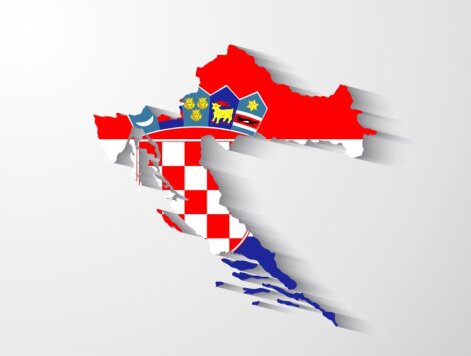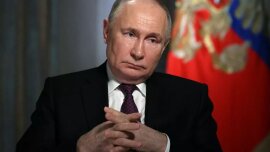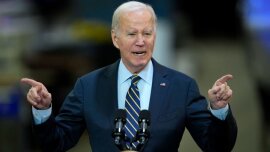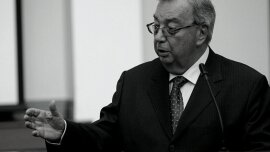On background of the telephone talks between Biden-Putin and then Biden-Zelenskyy, the Prime Minister of Croatia, Andriy Plenković, paid an official visit to Kyiv, which had been less noticeable in the information space of Ukraine. And it's a pity. At this difficult time for Ukraine, we need to take another close look at Croatia's experience of returning the temporarily occupied territories and joining NATO and the EU.
Let me remind you of just a few very important facts of our bilateral relations.
On December 5, 1991, Croatia was one of the first countries in the world to recognize Ukraine's state independence, and on December 11, 1991, Ukraine was the third country in the world to recognize Croatia's state independence. Therefore, the official visit of the Croatian Prime Minister took place during an important event: the 30th anniversary of the celebration of mutual recognition of the restoration of state independence.
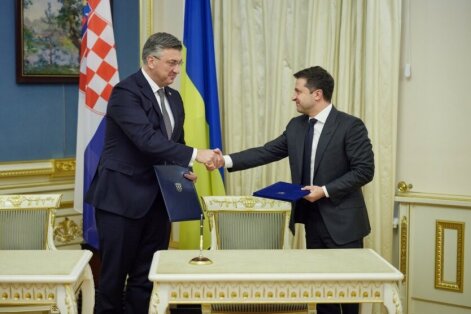
Meeting of Volodymyr Zelenskyy with the Prime Minister of Croatia Andrej Plenković
Photo: press service of the President of Ukraine
During the visit, Andrej Plenković and President Volodymyr Zelenskyy signed a joint Declaration on Ukraine's European Perspective, which noted Zagreb's full support for Ukraine's European and Euro-Atlantic integration process, a regular meeting of the Joint Intergovernmental Commission on Economic Cooperation was held, following the results of which three bilateral agreements and a final protocol were signed, as well as a Ukrainian-Croatian business forum, which was opened by two prime ministers. In other words, the visit of the head of government is quite friendly for our country, but I would like to dwell on a few very important things that were behind the scenes.
First of all, in many ways we have similarities between the historical destiny of our countries and both nations. Let me remind you that at the end of the 6th century from the territory of modern Ukraine, the middle and upper tributaries of the Dniester River, Croatian tribes moved to a new region of residence - between the Danube and the Adriatic Sea. This is a unique case of migration of Slavs from our territory to new territories, in particular the Balkan Peninsula. After all, the Slavic population that moved gave the name of the new state after the Croatian tribes.
However, not all Croat tribes left their lands on the upper Dniester: some of them remained, and in the history of our state they are known as "white Croats", who later became an ethnic part of the Ukrainian people, which began to emerge in Rus' state with centre in Kyiv.
After a certain historical period, Croats, like our Rus'-Ukrainian ancestors, lost their statehood, but in 1991 it was revived.
And here, attention: the Croats immediately fall into the grip of external aggression and internal secession, which was accompanied by a temporary loss of 27% of their own territory. They had to create their own armed forces from scratch and ensure that they were properly equipped under the international arms embargo.
As a result, the temporary loss of territories was replaced by the process of their gradual return, initially by force. This applied to lands far from the Croatian-Serbian border. But some of the territories - eastern Slavonia, western Srem and Baranja, bordering Serbia - were occupied peacefully - through diplomatic and political negotiations and the signing of the Erdut Agreement, which in many ways resembles Minsk.
The process of peaceful deoccupation lasted two years and used the mechanism of the UN peacekeeping mission, which played an important role in the reintegration process. There, local elections were also held before the introduction of Croatian control over an uncontrolled section of the Croatian-Serbian border.
There were also radicals across the country calling for the use of the army in the process of deoccupation, rather than a soft political and diplomatic force. Meanwhile, the President of the Republic of Croatia, F. Tudjman, stated that the military liberation of the territories on the border with Serbia and where regular Serbian troops are located will be very expensive for the Croatian people, so he will not allow speculation on this issue. At the time, the Croatian army had some autonomous volunteer units operating from the very first days of the aggression against Croatian statehood, but they were severely warned of criminal liability in support of political attacks on the peaceful reintegration course.
Opponents of President F. Tudjman's position, who presented themselves as great patriots of the state, did not dare to open rebellion, which threatened the current government. And only over the years have most of them recognized the political wisdom of the Croatian head of state's decision on the path of peaceful deoccupation.
By the way, these territories received a special status, but most of them concerned the economic nature - by declaring free economic zones, exemption from a number of taxes and financial incentives for the central government to create new jobs in the former occupied territories. There were some political concessions, but after the return of the former occupied territories to the state and legal space of Croatia, they were slowly "forgotten".
The Ukrainian state also went through its military deoccupation of part of the occupied territories in the Ukrainian Donbas in the summer of 2014. Now, as in Croatia, we are facing a process of peaceful reintegration. As before in Croatia, we have a large number of opponents of the process of peaceful reintegration, who present themselves as great patriots. Only the replacement of peaceful reintegration by the military will provoke a large-scale war with Russia, and Moscow will play information game in the world media, as if Ukraine is an aggressor, even though it is about our territories. And then the collective sanctions of the West against Moscow are unlikely to be applied, because the United States, France, Germany and NATO countries see wayout in the Minsk agreements, which are so similar to Erdut, the prospect of returning temporarily uncontrolled territories of Donbass to its rightful owner - the Ukrainian state. And without the deoccupation of our territories in the Donbas, or as some suggest abandoning them altogether, we will not get to the point of liberating the Crimean peninsula, which is actually the task of Russian foreign policy.
So let's be very vigilant. Instead of the Minsk agreements, Moscow will not sign the best document for Ukraine and will accuse Kyiv of disrupting the peace process and will appeal to the EU to cancel sanctions on Russia, because Ukraine allegedly sabotaged the Minsk agreements, which Moscow has been talking about for many years.
But Kyiv will make such a desirable scenario for Moscow impossible with its state support of the Normandy format and the Minsk process, because today it is a paramount of national interest. And after the return of the temporarily occupied territories, Ukraine will have a much better way to join NATO and the EU, as our friendly Croatia has successfully done.
